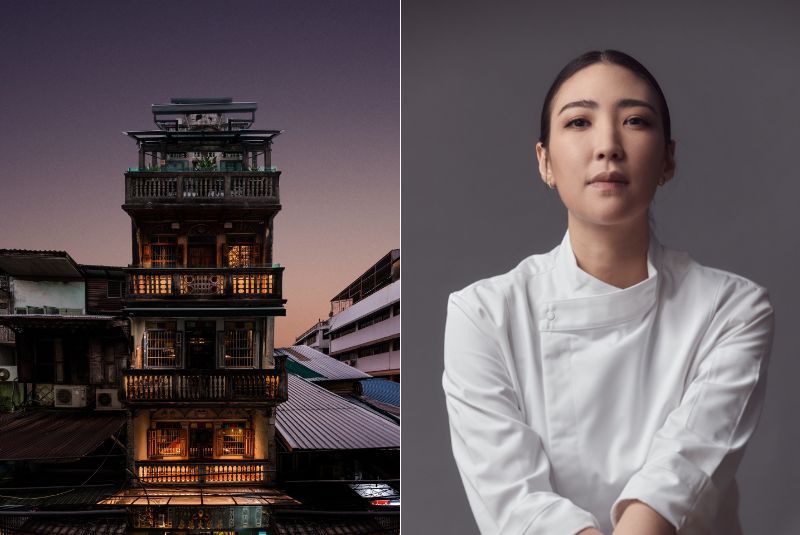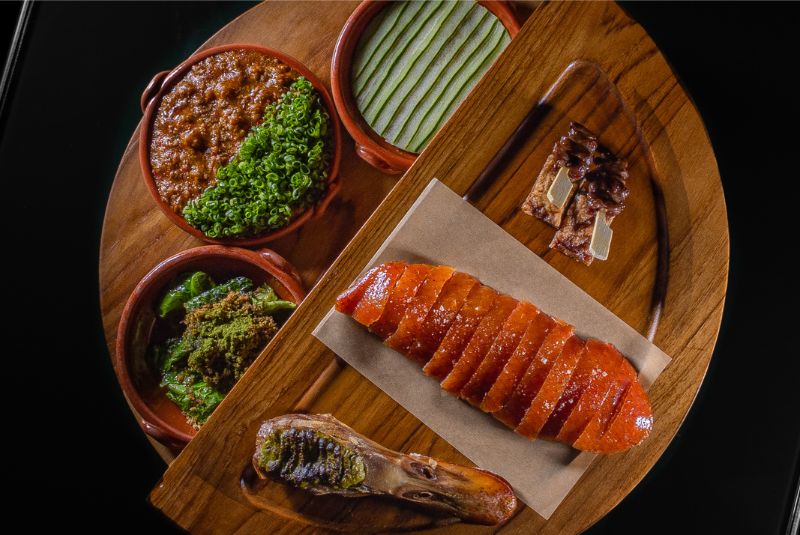Newly crowned Asia’s Best Female Chef 2024, chef Pichaya ‘Pam’ Soontornyanakij will receive her award at the Asia’s 50 Best Restaurants ceremony on Tuesday 26th March in Seoul. Here, she takes us inside Potong for a taste of her family’s culinary heritage and to find out why she’s championing female cooks from underprivileged backgrounds
A meal at Potong is as much about the iconic, multi-storey building and the generations who have lived there as it is about chef Pichaya ‘Pam’ Soontornyanakij’s progressive Thai-Chinese cuisine.
When guests arrive on the first floor of the former Bangkok pharmacy, they are given a glass of kombucha and told stories about the building’s history. Next, they’re transported to the fifth floor for their first bite – an edible leaf made from dried plum smoked with cinnamon, inspired by a Thai-Chinese greeting of luck and prosperity – paired with wine from a local producer and rooftop views over Chinatown. Finally, they are seated on the second or third floor for a 20-course meal shaped around the chef’s family stories.
“We want the customer to feel like they’re travelling back in time to a museum of my family’s heritage,” says the 34-year-old, whose ancestors lived on the very floors where she now serves her award-winning food. The 120-year-old building belongs to her grandfather, who lived there until he married in the late 1950s. He rented it out as a retail store but in 2019 the tenant left and Potong became vacant. That’s when Chef Pam, as she is widely known, first saw inside.
Potong’s building is 120 years old and was used as a pharmacy by Chef Pam's ancestors
“My grandfather and my parents took me to see the place where my ancestors did Chinese medicine,” she recalls. “I was drawn to it – my grandfather’s stories were very touching and I could feel my connection with the building. I could imagine people living there.”
Before beginning the extensive project to renovate Potong with her husband and business partner Tor Boonpiti , Chef Pam had seen plenty of success. Originally training to become a journalist, she turned to cooking and won a young chef award aged just 21, before moving to New York to study at the Culinary Institute of America and training under renowned chef Jean-Georges Vongerichten. She returned home, becoming a judge on Top Chef Thailand and establishing The Table restaurant and private dining experience. Throughout her career, she had often pondered the idea of her own dream restaurant. “And when I saw this place, I couldn’t think of anywhere else I would want it to be than Potong.”
So, despite the building’s location in ‘the middle of nowhere,’ with no parking and in an area not considered very ‘luxury,’ she knew she had found the right place.
“The building chose us,” she says.
Recognising Thai-Chinese cuisine
Since its opening in 2021, Potong has won a slew of awards, debuting onto Asia’s 50 Best Restaurants at No.35 in 2023 and earning a place on the extended list of The World’s 50 Best Restaurants in the same year. It’s thanks to the way Chef Pam skilfully weaves her family’s stories into her thought-provoking tasting menu, while spotlighting Thai-Chinese cuisine with creative spins on traditional recipes.
“I want customers to feel surprised and to learn about Thai-Chinese culture,” says the chef. “When people think of Thai food, they think of northern, southern, central or north-eastern, but Thai-Chinese is a sub-cuisine of Thai food. Chinese people have been migrating here for over 800 years and they’ve brought a lot of food culture with them.”
One dish that embodies Chef Pam’s Thai-Chinese heritage is the signature duck main – often hailed on social media as the ‘best duck ever’. After extensive experimentation, she found her own twist on a traditional Chinese recipe, creating a duck that is intensely crispy on the outside yet pink on the inside, and served with roasted duck brain, heart and leg.
Potong’s signature duck dish pays homage to the chef’s Thai-Chinese heritage
The duck is blanched with hot water and hung to dry in traditional style. Then it is blanched again with vinegar, glucose, soy sauce and five spice and hung in the refrigerator for 14 days to make the skin extra dry and to create a puffed effect when roasted. During service, it is cooked for just 10 minutes at a very high heat – a technique that makes for a sweetly fragrant, crispy lacquered skin with tender meat inside.
“Duck is a very versatile product,” she explains. “There’s the French technique, Chinese, Thai… I tried many variations but it always comes back to the authentic, traditional Chinese technique that I like [to eat]. I dry-age it to make a more complex flavour but the main technique is very old-school. Traditional techniques are there for a reason.” She is precise about the product, only buying ducks that weigh 2-2.1kg for the perfect ratio of skin, fat and meat.
Chef Pam’s commitment to progressive Thai-Chinese was sparked by her time overseas. “I was trained in French and western cuisine,” she says. “When I came back to Thailand, I wanted to use all the knowledge I’d learned but also to cook a cuisine that really belongs to my heritage.” She now also runs the more casual, multi-outlet Smoked, serving the Texas-style barbecued meat she craved after she returned home to Bangkok.
Increasing women’s representation
A further characteristic she developed during her time in the US is discipline – an attribute she strives to pass on to young chefs. With her new title of Asia’s Best Female Chef 2024, Chef Pam wants to empower other women.
“We have many young female chefs on our team who are here because they look up to me,” she says. “This award will inspire them even more and allow them to dream big and to think that someday they’ll have their own spot in the industry too. It also reflects my belief in chef skills, respect for heritage and the power of hard work and sacrifice.”
Through the Women to Women scholarship, a young chef joins Potong for a year of training
The award comes as Chef Pam announces the first winner of her Women for Women scholarship, which she set up with American Women’s Club of Thailand, a non-profit that supports young women in poor rural areas to finish high school. The recipient – selected from those high school students with a particular interest in learning to cook – wins a year-long internship at Potong in Bangkok, with financial support to build a life in the city.
“It’s a jump-start for their career,” she says. “We choose only one winner per year because we really want the result to be good – we want to see this girl become great in the industry, so that someday she can empower younger generations too.”
Making sacrifices
While she strives to increase women’s representation in top restaurant positions, Chef Pam acknowledges they will always need help. She was pregnant when Potong was in construction, and having a three-year-old means she can’t always spend as much time with her daughter as she might like. “But this is all for her and for the future of the family. I want her to see what I’ve done.”
It’s helpful, she says, that she lives in a culture where having staff at home is the norm, and she is also grateful to her husband, who gave up his career in IT consulting to manage the business side of the restaurants so she could pursue her passion. “He left his career for mine,” she says..jpg)
While pregnant, she ideated her tasting menu, designed to stimulate all five senses
It was when she was pregnant that the chef developed her idea for the five senses that runs through her tasting menu. Her dishes already incorporated the five elements of salt, acid, spice, texture and ‘Maillard reaction’ (a chemical way of reducing sugars that brings distinctive flavour), but when she read a book about parenting, she learned about the five senses that help an infant to learn. According to the book, a child forms a long-term memory whenever they experience all five senses at once. In the case of an apple, the child would need to see, smell, taste and touch it and hear the word ‘apple’ before developing a long-term memory. “I want my customers to make long-term memories at Potong so I try to incorporate all five senses during the dining experience,” she explains, citing the edible leaf, eaten with the hands at the start of the meal, as a perfect example.
Balance and humility
Memories, stories and family heritage are all themes that run throughout the restaurant. While many of the courses feel progressive and modern, the duck main is served on a family-style ‘lazy Susan’ to evoke a more traditional, homely vibe. “At big family gatherings, we eat at a round table with a lazy Susan, where you feel the warmth and love of sharing. I want the customer to feel a sense of belonging, home and love, so I finish the main course with that feeling of fulfilment.”
Potong means ‘simple’ in Chinese and was the original name given to the family pharmacy by her great-great-grandfather. “I asked my grandad why his grandad named it ‘simple’ when it should be something like ‘golden’ pharmacy. He said he wanted the family to be very simple in terms of happiness, life and being humble and balanced in everything.”
So she kept the name Potong, creating a restaurant that remains humble and true to her family heritage, yet with a progressive modernity that attracts diners from all over the world. With her new title of Asia’s Best Female Chef, that popularity is set to accelerate further – and Chef Pam is sure to inspire generations of young chefs along the way.
Now watch the video with Chef Pam, Asia’s Best Female Chef 2024 winner:
The 12th edition of Asia’s 50 Best Restaurants, sponsored by S.Pellegrino & Acqua Panna, will be announced on 26th March 2024 from Seoul. To stay up to date with the latest news and announcements ahead of the ceremony, browse the website, join the community on Instagram, find us on Facebook, visit us on X, subscribe to our YouTube channel and sign up for the 50 Best newsletter.
.jpg)
